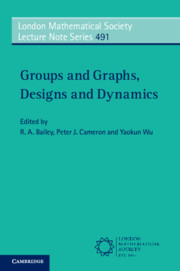2 - Quantum probability approach to spectral analysis of growing graphs
Published online by Cambridge University Press: 11 May 2024
Summary
These lecture notes provide quantum probabilistic concepts and methods for spectral analysis of graphs, in particular, for the study of asymptotic behavior of the spectral distributions of growing graphs. Quantum probability theory is an algebraic generalization of classical (Kolmogorovian) probability theory, where an element of a (not necessarily commutative) ∗-algebra is treated as a random variable. In this aspect the concepts and methods peculiar to quantum probability are applied to the spectral analysis of adjacency matrices of graphs. In particular, we focus on the method of quantum decomposition and the use of various concepts of independence. The former discloses the noncommutative nature of adjacency matrices and gives a systematic method of computing spectral distributions. The latter is related to various graph products and provides a unified aspect in obtaining the limit spectral distributions as corollaries of various central limit theorems.
Keywords
- Type
- Chapter
- Information
- Groups and Graphs, Designs and Dynamics , pp. 87 - 175Publisher: Cambridge University PressPrint publication year: 2024

